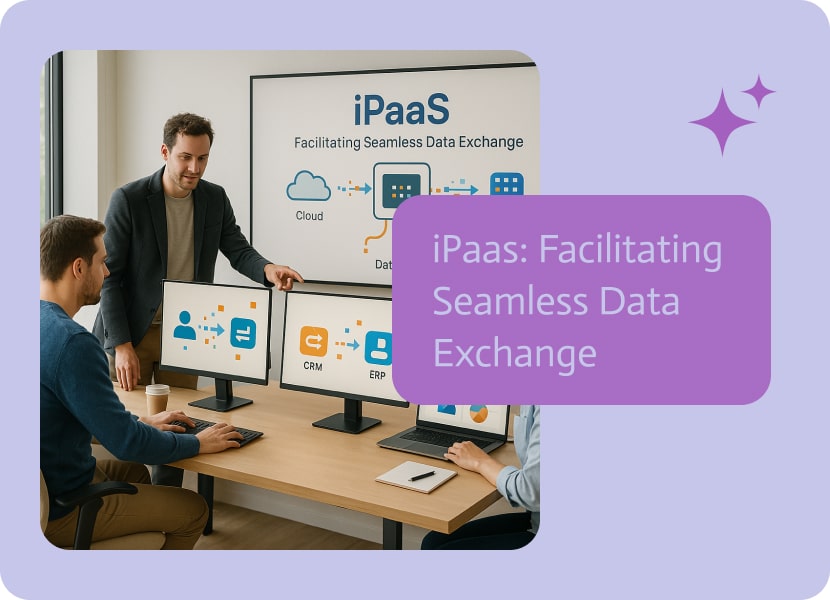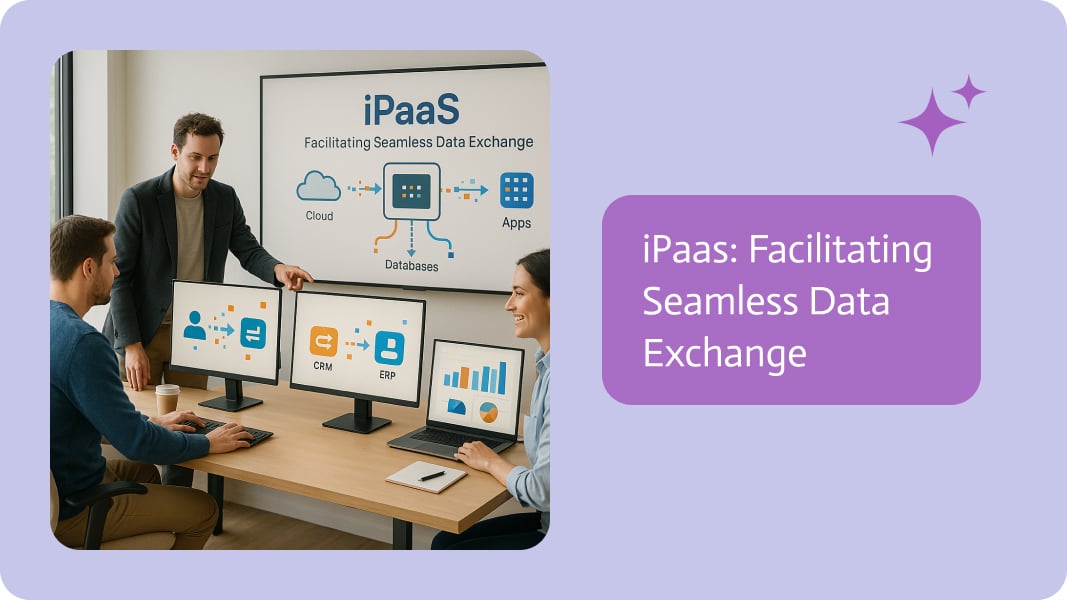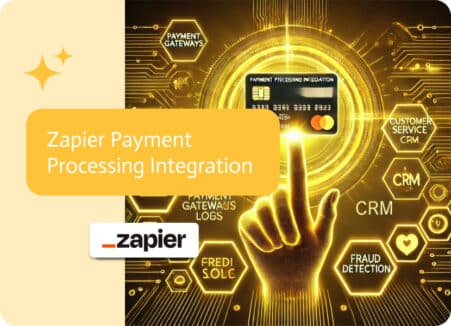

iPaas: Facilitating Seamless Data Exchange
In today’s world, where everything’s linked up online, information is super important for businesses. Being able to easily share, combine, and keep data consistent between all sorts of programs and systems is now a must for staying competitive and growing.
That’s where Integration Platform as a Service (iPaaS) steps in as a game-changer. It helps groups get the most out of their data and move forward with their digital upgrades.
The iPaaS market is really taking off, it’s expected to jump from $9.57 billion in 2024 to a huge $132.49 billion by 2033, that’s like growing by 33.92% each year! This big jump is because businesses need to be quick, and automated, especially since we’re relying more and more on cloud services, AI, and getting information right away.
So, what’s iPaaS and how does it do its job?
iPaaS is like a toolbox in the cloud. It’s got all kinds of tools and services to handle integrations and data flow between different programs, both in the cloud and on-site. Unlike old-fashioned ways of connecting things, which often involve custom coding, iPaaS gives you a standard, bendable, and expandable way to do things.
Basically, iPaaS makes it easy to share data by:
Having Ready-Made Connectors: iPaaS platforms come with a bunch of connectors that are already set up for popular business programs (like CRM, ERP, marketing tools, and online stores), databases, and cloud services. These connectors make it way faster to create integration flows, so you don’t have to do a lot of coding from scratch.
Changing and Organizing Data: Data often looks different depending on where it’s coming from. iPaaS solutions have strong tools for changing, organizing, and cleaning up data. This makes sure that data from different places works together, is correct, and is ready to be used in the systems you want it in.
Automating Workflows: iPaaS platforms let you automate complicated business tasks by setting up rules and triggers. This gets rid of manual work, makes things more efficient, and keeps data flowing smoothly between connected systems.
Managing APIs: A lot of iPaaS platforms can also manage APIs. This means you can create, share, protect, and keep an eye on APIs, which are super important for sharing data securely and reliably between systems.
Keeping an Eye on Things: iPaaS solutions usually have dashboards and tools that let you track how well your integrations are working in real-time. You can spot and fix problems, and make sure your data is safe and follows the rules.
What’s coming up for iPaaS in the future?
The world of iPaaS is changing fast, thanks to these trends:
AI Doing Integrations: AI is changing iPaaS by automating tasks, making data mapping better, and predicting when data might go wrong. AI helpers can think for themselves and take action, which makes things more efficient, accurate, and innovative. It also allows for workflows that can learn and adapt on their own. Using AI to create content is becoming more important too.
More Cloud Solutions: Since everyone’s using cloud services now, iPaaS is becoming the go-to solution for cloud-based setups. iPaaS platforms are made to be scalable and bendable, so they’re perfect for connecting programs across different cloud setups.
Real-Time Data: Businesses want information right away so they can make decisions quickly. iPaaS is key to making this happen. It lets data be processed and acted on as soon as it’s created, which is important for industries like finance and supply chain.
APIs Connecting Everything: APIs are the backbone of online systems today. iPaaS platforms make it easier to connect different systems using APIs, which also supports the use of microservices.
Everyone Can Integrate: iPaaS platforms are now letting people with little to no coding skills build and manage integrations. This means businesses don’t have to rely as much on IT experts and can come up with new ideas faster.
Better Security: As you connect more things, there are more chances for problems. iPaaS platforms are focusing on security, using things like encryption, zero-trust setups, and AI to keep data safe and ethical.
What’s good about using iPaaS for sharing data easily?
Using iPaaS has a lot of benefits for businesses:
- Faster Digital Changes: iPaaS makes it easier to connect new tools and data sources, which speeds up digital upgrades.
- Better Operations: Automated workflows and real-time data make operations more efficient and productive.
- More Accurate Data: iPaaS makes sure data is consistent across all systems, so you have one reliable source of information for making decisions.
- More Flexibility: iPaaS platforms can handle growing data amounts and changing business needs easily.
- Less IT Work: iPaaS simplifies integrations, which lowers costs and frees up IT staff.
- Support for Cloud Setups: iPaaS is great at connecting programs and data across different cloud environments.
How can iPaaS be used?
- Connecting Programs: Connecting CRM, ERP, marketing tools, and online stores to keep data consistent and automate tasks.
- Keeping Data Consistent: Making sure data stays the same across different sources in real-time.
- Connecting with Partners: Sharing data easily with partners and suppliers to automate things like orders and invoices.
- Cloud Connections: Connecting on-site systems with cloud programs.
- Moving Data: Moving data safely from old systems to new cloud platforms.
- Automating Processes: Automating business tasks by connecting data flows across multiple programs.
- Business Intelligence: Gathering data from different systems to feed BI tools and AI for advanced analysis and personalized experiences.
What are the challenges and how can they be solved?
Even though iPaaS has advantages, there can be challenges:
Complex Integrations: Connecting different programs can be hard. iPaaS platforms have pre-built connectors and data transformation tools to simplify things.
Old Systems: Connecting iPaaS with old systems can be tricky. iPaaS often provides ways to bridge technological gaps, so you don’t have to replace everything at once.
Data Security: Keeping data safe as it moves across systems is important. iPaaS vendors focus on security with encryption and access control. AI is also being used to manage security in integrations.
Scalability: Making sure iPaaS can handle more data is key. iPaaS platforms can scale, offering things like parallel processing and real-time monitoring.
Vendor Lock-in: Relying on one iPaaS provider can make it hard to switch. Businesses should think about how well iPaaS solutions work with their current and future IT setups.
The Verdict
iPaaS is a key technology for businesses that want to share data easily. It simplifies integrations, automates tasks, and makes sure data is accurate. As AI gets more involved and the need for real-time information grows, iPaaS will continue to change, and Noca is always trying to stay one step ahead of the game. Businesses that use iPaaS strategically will be able to get the most out of their data, come up with new ideas, and stay ahead of the competition.


